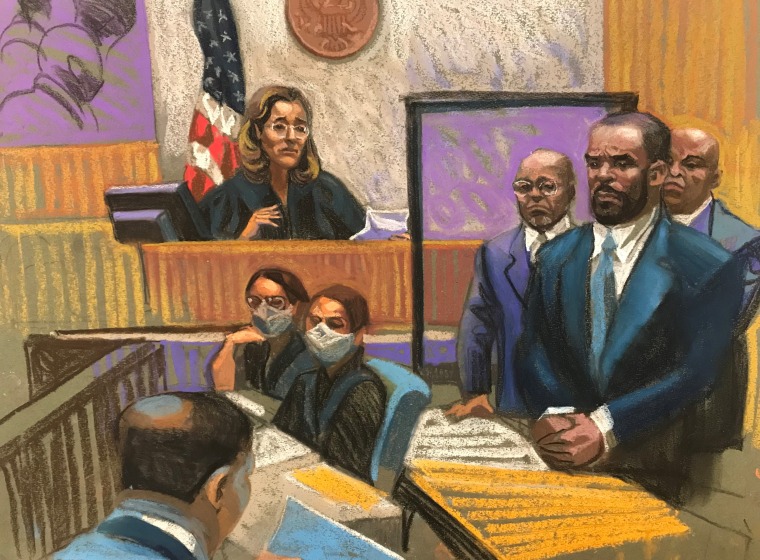R. Kelly, the R&B superstar who has long been trailed by accusations of sexual misconduct and abuse, was found guilty in New York on Monday on all counts in a high profile sex-trafficking case, capping a trial that featured hours of graphic testimony from his accusers.
Kelly, who has been in custody for much of the time since he was formally charged in 2019, was convicted on one count of racketeering and eight counts of violating the Mann Act, the law that bars transporting people across state lines "for any immoral purpose."
"Today's guilty verdict forever brands R. Kelly as a predator, who used his fame and fortune to prey on the young, the vulnerable, and the voiceless for his own sexual gratification," acting U.S. Attorney Jacquelyn Kasulis said in a statement.
"To the victims in this case, your voices were heard, and justice was finally served. We hope that today's verdict brings some measure of comfort and closure to the victims," Kasulis added.
Kelly, 54, who faces decades in prison when he is sentenced May 4, wore a mask and appeared stoic as the verdict was read aloud in U.S. District Court in Brooklyn.
Kelly "didn't say much of anything" after the verdict was announced, his attorney Deveraux Cannick told reporters. "He was shocked."
Kelly, best known for the 1996 hit "I Believe I Can Fly," pleaded not guilty to all charges. The singer, whose real name is Robert Sylvester Kelly, did not take the stand in his own defense.
Gerald Griggs, a lawyer who said he represents several of Kelly's accusers and their families, thanked his clients for their "immense strength" and expressed his gratitude to prosecutors.
"This is just the beginning. We've been fighting this battle since 2017, and many of the victims have been fighting this battle for years," Griggs said. "Finally, their voices were heard."
The prosecutors in the trial, which centered on the allegations of six people, said Kelly was a serial sexual predator who abused young women, as well as underage girls and boys, for more than two decades.
Prosecutors further alleged that he and his entourage led a criminal enterprise that recruited and groomed victims for sex, arranging for them to travel to concerts and other events across the U.S.
In a closing argument that lasted two days, Assistant U.S. Attorney Elizabeth Geddes accused Kelly and his entourage of using tactics from "the predator playbook" to control his victims.
Kelly was accused of confining victims in hotel rooms or his recording studio, managing when they could eat and use the bathroom and forcing them to follow various "rules," including demanding that they call him "Daddy."
"It is now time to hold the defendant responsible for the pain he inflicted on each of his victims," Geddes said in court Thursday. "It is now time for the defendant, Robert Kelly, to pay for his crimes. Convict him."
Geddes said one of several explicit videos in evidence, which was seen by the jury during testimony but not made available to the public, showed Kelly grabbing a victim by the hair and forcing her to perform oral sex on another man.
The woman's "will had been broken," Geddes said.
Kelly's attorneys tried to portray his accusers as "groupies" who sought to exploit his fame and take advantage of the #MeToo movement.

Cannick argued that testimony from several accusers was false, saying in his closing argument: "Where is the fairness to Robert? Where's the integrity of the system?"
Cannick argued that a celebrity like his client would have no need for a criminal enterprise to lure people for sexual activity. He "didn't have to recruit women," Cannick told jurors.
He argued that Kelly's accusers were never forced to do anything against their will. They remained in his company, he argued, because Kelly treated them to expensive dinners, free air travel and other perks.
In the 1990s and the 2000s, Kelly was considered one of the kings of R&B. He was widely credited with helping to redefine the genre with popular tracks like "Bump N' Grind" and "I'm a Flirt (Remix)" and the "hip-hopera" project "Trapped in a Closet."
But the behavior he was accused of behind the scenes attracted greater public scrutiny with the rise of the #MeToo movement, leading to the #MuteRKelly social media campaign, boycotts of his records and protests across the country.
"Surviving R. Kelly," a Lifetime documentary series released in 2019 that featured testimony from several accusers, intensified calls for him to face legal consequences.
Kelly was acquitted of child pornography charges in 2008.
The criminal proceedings in New York, which started Aug. 18 and spanned about six weeks, included testimony from more than 45 witnesses. The jury of seven men and five women got the case Friday and deliberated for nine hours.
Kelly also faces charges in Illinois and Minnesota.

